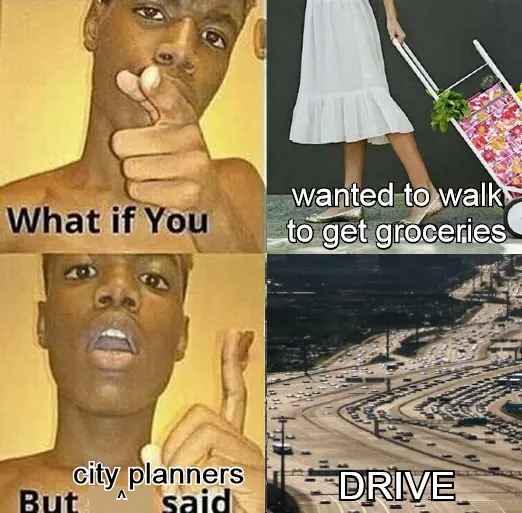Fuck Cars
A place to discuss problems of car centric infrastructure or how it hurts us all. Let's explore the bad world of Cars!
Rules
1. Be Civil
You may not agree on ideas, but please do not be needlessly rude or insulting to other people in this community.
2. No hate speech
Don't discriminate or disparage people on the basis of sex, gender, race, ethnicity, nationality, religion, or sexuality.
3. Don't harass people
Don't follow people you disagree with into multiple threads or into PMs to insult, disparage, or otherwise attack them. And certainly don't doxx any non-public figures.
4. Stay on topic
This community is about cars, their externalities in society, car-dependency, and solutions to these.
5. No reposts
Do not repost content that has already been posted in this community.
Moderator discretion will be used to judge reports with regard to the above rules.
Posting Guidelines
In the absence of a flair system on lemmy yet, let’s try to make it easier to scan through posts by type in here by using tags:
- [meta] for discussions/suggestions about this community itself
- [article] for news articles
- [blog] for any blog-style content
- [video] for video resources
- [academic] for academic studies and sources
- [discussion] for text post questions, rants, and/or discussions
- [meme] for memes
- [image] for any non-meme images
- [misc] for anything that doesn’t fall cleanly into any of the other categories
Recommended communities:
view the rest of the comments

Hey!
I can answer this pretty well as I grew up and lived in a pretty car dependant Minneapolis until I was 23, where then I moved to NYC with no car in 2018 and have lived here ever since.
The TL;DR to this question is that you transport everything in a grocery bag on person, but the longer answer is that your buying and cooking behavior changes.
Back in Minneapolis I relied on buying in bulk, since I wanted to limit the number of trips in the 15-20 min drive between my apt and the Costco. Variability with the weather affected this too, as I would buy extra if it was in the winter time. I'd make this trip by car around 2-3 times a month. This also affected my buying and cooking decision making as well. Buying groceries first then figuring out what I wanted to cook.
Once I moved to NYC, I would always have a grocery store several blocks away from me. At most being a short 5-10 min walk. This changed my habits as I always had a grocery store I could quickly pop in without having to think about traffic, my car, etc. So although I would go more frequently (~ 2 times a week), I would also find this a lot easier and would buy less.
Nowadays, whenever I think of wanting to cook something, I either head over to the store on my way back to the office, after the gym, etc. and then cook that very same day what I bought.
In my mind, that big fridge I used to restock with my Costco runs has been replaced by having that quick grocery store within walking distance.
Purely anecdotal, since I know some other people in the US may be living different than a single guy living in an apt in NYC, but this is also how it is in many cities I've traveled to in Asia and Europe.
I miss NYC for this reason alone, among a few other reasons. I used to walk and bike everywhere, didn't even need the MTA.
Thanks for the in depth answer! This has me wondering whether I can live without a car here in the bay already, but our infrastructure is not nearly as good as NYC’s. Anecdotally, things here are a lot more compact than Texas so I do find myself going out more for smaller trips anyway.
Curious, did buying groceries more end up costing more?
I lived in Boston for a while (with a car, but putting low miles on it)
When I switched from buying in bulk periodically to buying small more often, I can say that my first few weeks definitely cost more. I had a mindset about buying for X weeks out instead of X days out that took a bit to shake. In the process I realized how much food waste I was having by purchasing in bulk and not fully using everything, and I naturally switched to purchasing less at the grocery store. Both because it meant carrying less home but also because it was cheaper. Now I buy more or less exactly what I need and I can say on average my grocery spending is less now (avg monthly) than it was when I was buying in bulk.
Hmm on my end the answer is tough because it really matters haha
In Minneapolis I was exclusively going to Costco and Cub Foods. Costco, things were cheap in bulk, while Cub Foods you always had good deals in coupons.
Estimated bill from Costco being 80-100 every 2 weeks, Cub probably 60-70 every 2 weeks (this is in 2017, so pricing has changed quite a bit haha)
In NY, my bill shifted based on where I shopped.
When I lived in midtown Manhattan on 54th and 7th in 2018, I went to the Whole Foods in Columbus Circle and would leave with a bill around $60 a week. But back then when I first moved, I was also eating out a ton.
Nowadays, I live in LIC in Queens and go to some local grocery chains and cook a whole lot more. My weekly spend is around $120 or so a week. But I'm also cooking a whole lot more than I used to and eating out a lot less.
I forgot who said it, but someone said it best "if it weren't for rent, NY would actually be very livable cost-wise."